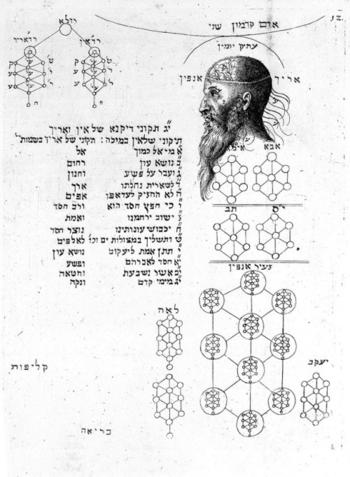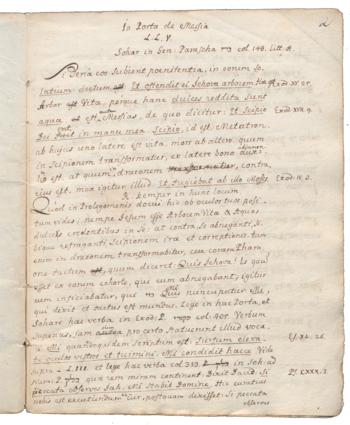The Zohar project funded by the DFG aims to investigate the impact of the Zohar in the Christian world from the 16th to the 19th Centuries.
Institut für Judaistik
Gefördert durch die DFG.
Christian Knorr von Rosenroth, Kabbala Denudata, Sulzbach 1678
Bildquelle: Uppsala Universitetsbibliotek
Uppsala, Universitetsbibliotek, O Hebr. 45:2, fol.2r
Bildquelle: www.archive.org
Seit 2012 wird unter Leitung von Prof. Dr. Busi das mittelalterliche Hauptwerk der Mystik- Sefer ha-Zohar, erforscht. Das von der DFG geförderte Projekt beschäftigt sich hierbei zum ersten Mal mit dem Einfluss des vielschichtigen sowie geheimnisvollen Buches der Herrlichkeit auf die europäische Kultur.
The impact of the book of the Zohar on Western Christian culture extends for centuries, those that shaped modern European history from the Italian Renaissance to the age of German idealism. Over this long span of time, several Christian philosophers, orientalists, philologists and theologians struggled to translate the hybrid language of the Zohar, and to unravel the meaning of the symbolical speculations entailed in it. Some authors praised it as a treasure of ancient and sacred wisdom, others debunked it as a literary forgery devised during the Middle Age.
This little-studied chapter of the history of the relationship between Christian and Jewish culture is animated by illustrious thinkers, obscure scholars, heretics, converts, visionaries, whose works are still largely preserved only in manuscripts, and whose printed writings, besides few exceptions, have neither been studied nor translated. These untapped sources conceal some of the most surprising and fascinating attempts at combining the knowledge of the Western tradition with a new symbolic universe.
This research sets out to illustrate the more relevant and meaningful steps of the Christian reception of the Zohar. We shall provide a philological and hermeneutical analysis of the seventeenth- to nineteenth- centuries texts pertaining to the direct and indirect Zoharic tradition. On the one hand we will take into account editions of the Aramaic text and translations of it published by Christian editors. On the other hand, we will focus on commentaries, explanations, lexica, and theological reworking of the Zohar, offering for each case an analysis of the historical and cultural context in which they were produced.
The Zohar project is developed mainly by dr. Raphael Ebgi. Dr. Ebgi is specialized in the history of Renaissance philosophy and culture, with a particular focus on the relationship between Italian Renaissance and Jewish thought. Prof. Giulio Busi (Freie University, Berlin), managing director of the Institute of Jewish studies, is the Applicant of the project by the DFG. The project’s advisors are Prof. Saverio Campanini (University of Bologna), among the leading scholars in the field of Christian Kabbalah, and Prof. David Ruderman (University of Pennsylvania), worldly renown scholar, whose research encompasses the whole spectrum of Modern Jewish History.







